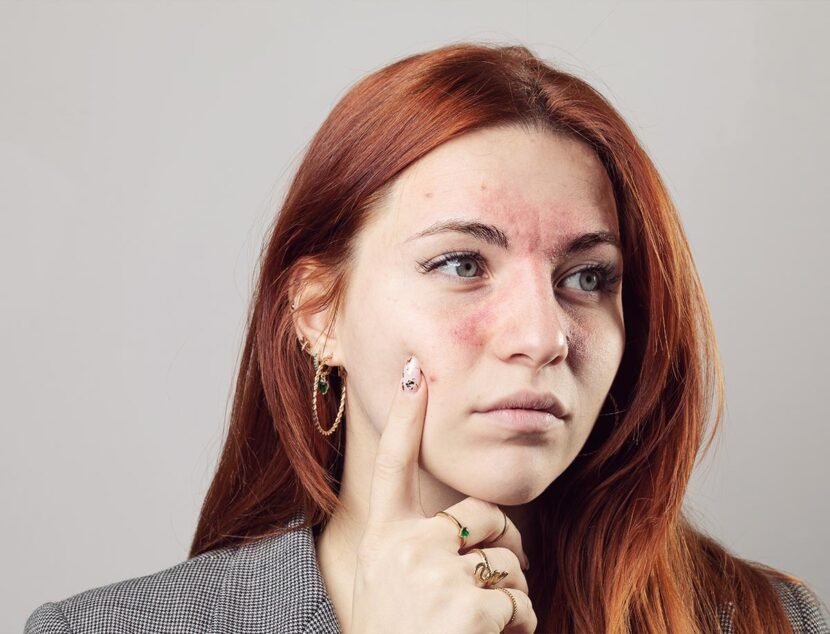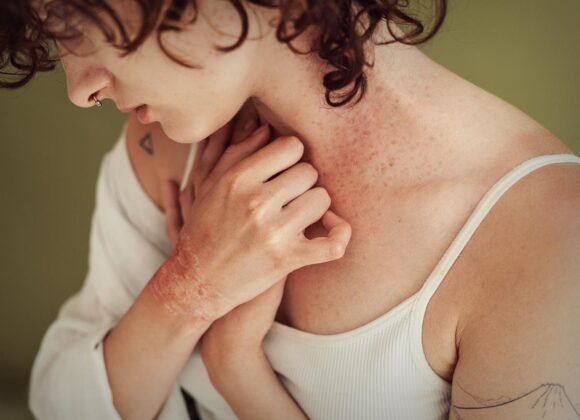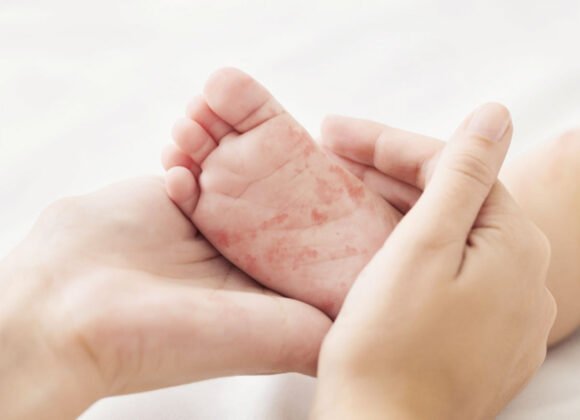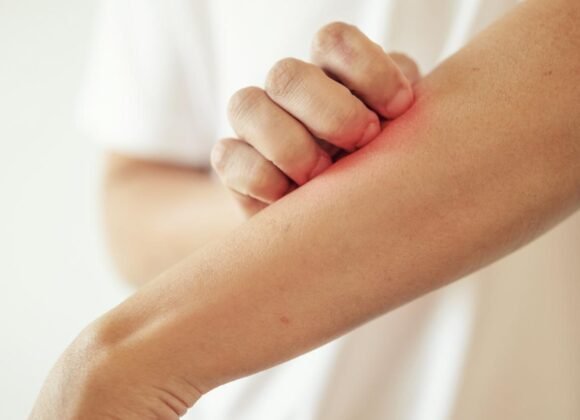Facial eczema is a prevalent skin condition affecting individuals with sensitive skin. It manifests as red, inflamed, and itchy patches on the face, primarily around the eyes, cheeks, and forehead. Eczema is a chronic condition characterized by periodic flare-ups, causing discomfort and self-consciousness in affected individuals.
While the exact cause of facial eczema remains unclear, it is believed to result from a combination of genetic and environmental factors. People with a family history of eczema, asthma, or allergies have a higher likelihood of developing facial eczema. Environmental triggers such as harsh weather, irritants in skincare products, and stress can also contribute to flare-ups.
The impact of facial eczema on an individual’s quality of life can be significant. The visible redness and inflammation may lead to self-esteem issues, while the persistent itching causes considerable discomfort. Sleep disturbances due to itchiness are common, further affecting overall well-being.
Understanding the nature of facial eczema and its effects on sensitive skin is essential for effective management of the condition and improving the quality of life for those affected.
Key Takeaways
- Facial eczema is a common skin condition that affects sensitive skin, causing redness, dryness, and irritation.
- Symptoms of facial eczema include red or inflamed patches, itching, and a burning sensation on the skin.
- Dealing with itchy skin caused by facial eczema can be managed with gentle skincare products and avoiding triggers like harsh soaps and extreme temperatures.
- Identifying and avoiding triggers such as certain foods, stress, and allergens can help in managing and preventing flare-ups of facial eczema.
- Treatment for facial eczema involves using gentle skincare products, moisturizing regularly, and in some cases, using prescription medications to manage symptoms. Seeking professional help from a dermatologist is important for severe or persistent cases of facial eczema.
Eczema Symptoms: Recognizing the Signs of Facial Eczema on Sensitive Skin
Common Symptoms of Facial Eczema
Common symptoms of facial eczema include red or brownish-gray patches on the skin, particularly around the eyes, cheeks, and forehead. These patches may be accompanied by dry, scaly skin and intense itching.
Variations in Severity and Impact
In severe cases, the skin may become thickened and develop small, raised bumps that ooze and crust over. It is important to note that facial eczema can vary in severity from person to person, and some individuals may experience mild symptoms while others may have more severe flare-ups.
Emotional and Psychological Impact
In addition to the physical symptoms, facial eczema can also have a significant impact on an individual’s emotional well-being. The visible redness and inflammation can cause self-esteem issues, leading to feelings of self-consciousness and embarrassment. The constant itching can also be distressing and affect a person’s ability to focus on daily activities.
Itchy Skin: Dealing with the Uncomfortable Sensation of Facial Eczema
One of the most challenging aspects of facial eczema is dealing with the uncomfortable sensation of itchy skin. The constant itching can be distressing and affect a person’s ability to focus on daily activities. It can also lead to disrupted sleep patterns, as the urge to scratch can be particularly strong at night.
Managing itchy skin is essential for improving the quality of life for individuals with facial eczema. There are several strategies for dealing with itchy skin caused by facial eczema. Using gentle skincare products that are specifically formulated for sensitive skin can help soothe the itchiness and reduce inflammation.
Applying moisturizers regularly can also help keep the skin hydrated and minimize itching. Additionally, using cold compresses or taking cool showers can provide temporary relief from itching. It is important to avoid scratching the affected areas, as this can further irritate the skin and lead to potential infections.
Eczema Triggers: Identifying and Avoiding Factors that Aggravate Facial Eczema in Sensitive Skin
Identifying and avoiding triggers that aggravate facial eczema is crucial for managing the condition and preventing flare-ups. Common triggers for facial eczema include harsh weather conditions, such as extreme heat or cold, which can dry out the skin and lead to flare-ups. Irritants in skincare products, such as fragrances, dyes, and preservatives, can also trigger eczema flare-ups in sensitive skin.
Stress is another common trigger for facial eczema, as it can weaken the immune system and lead to increased inflammation. To identify triggers for facial eczema, individuals can keep a journal to track their symptoms and potential triggers. This can help them identify patterns and make necessary changes to their skincare routine or lifestyle to avoid triggers.
Making simple changes, such as using fragrance-free skincare products, wearing protective clothing in extreme weather conditions, and practicing stress-reducing techniques, can help minimize flare-ups and improve the overall health of sensitive skin affected by eczema.
Eczema Treatment: Managing Facial Eczema and Soothing Sensitive Skin
Managing facial eczema requires a comprehensive treatment approach that addresses both the physical symptoms and emotional impact of the condition. Topical corticosteroids are commonly prescribed to reduce inflammation and itching associated with facial eczema. These medications work by suppressing the immune response in the affected areas, providing relief from redness and discomfort.
In more severe cases, oral corticosteroids or immunosuppressant medications may be prescribed to manage flare-ups. In addition to medication, individuals with facial eczema can benefit from incorporating gentle skincare practices into their daily routine. Using mild cleansers and moisturizers that are specifically formulated for sensitive skin can help soothe irritation and maintain hydration.
Avoiding harsh skincare products that contain fragrances, dyes, or preservatives is essential for preventing further irritation. It is also important to protect the skin from harsh weather conditions by wearing appropriate clothing and using sunscreen.
Skincare Routine for Facial Eczema: Tips for Caring for Sensitive Skin Affected by Eczema
Gentle Skincare Products
When caring for sensitive skin affected by eczema, it is important to use gentle skincare products that are free from fragrances, dyes, and other potential irritants. Cleansing the skin with a mild, non-abrasive cleanser can help remove impurities without stripping away natural oils.
Moisturizing and Hydration
Following up with a fragrance-free moisturizer can help maintain hydration and soothe dryness.
Protecting Skin from Environmental Triggers
In addition to using gentle skincare products, individuals with facial eczema should also take steps to protect their skin from environmental triggers. Wearing protective clothing, such as hats and sunglasses, can help shield the skin from harsh weather conditions. Using sunscreen with a high SPF can also help prevent sunburn and minimize the risk of flare-ups. It is important to be mindful of potential triggers and make necessary adjustments to skincare routines to accommodate the needs of sensitive skin affected by eczema.
Seeking Professional Help: When to Consult a Dermatologist for Facial Eczema on Sensitive Skin
Seeking professional help from a dermatologist is essential for effectively managing facial eczema on sensitive skin. If over-the-counter treatments are not providing relief or if symptoms are becoming increasingly severe, it may be time to consult a dermatologist for further evaluation and treatment options. A dermatologist can provide a comprehensive assessment of the condition and recommend appropriate medications or therapies to manage flare-ups.
In addition to medical treatment, a dermatologist can also provide valuable guidance on developing a skincare routine tailored to the needs of sensitive skin affected by eczema. They can recommend specific products that are suitable for sensitive skin and provide tips for minimizing potential triggers in daily life. Seeking professional help from a dermatologist can provide individuals with the support they need to effectively manage facial eczema and improve their overall quality of life.
In conclusion, understanding facial eczema and its effects on sensitive skin is crucial for effectively managing the condition and improving the quality of life for those affected. Recognizing the signs of facial eczema, dealing with itchy skin, identifying triggers, seeking appropriate treatment, developing a skincare routine tailored to sensitive skin affected by eczema, and consulting a dermatologist when necessary are all important steps in managing this chronic condition. By taking proactive measures to care for sensitive skin affected by eczema, individuals can minimize flare-ups and enjoy healthier, more comfortable skin.
FAQs
What is facial eczema?
Facial eczema is a skin condition characterized by red, inflamed, and itchy patches on the face. It is a form of eczema that specifically affects the sensitive skin on the face.
What causes facial eczema?
Facial eczema can be caused by a variety of factors, including genetics, environmental triggers, and skin sensitivities. Common triggers include harsh skincare products, allergens, stress, and changes in weather.
How does facial eczema affect sensitive skin?
Facial eczema can cause sensitive skin to become even more irritated, inflamed, and prone to itching. It can also lead to dryness, flakiness, and a compromised skin barrier, making it more susceptible to further irritation and sensitivity.
What are the common symptoms of facial eczema?
Common symptoms of facial eczema include redness, inflammation, itching, dryness, flakiness, and in severe cases, oozing and crusting. It can also cause the skin to feel tight and uncomfortable.
How is facial eczema treated?
Treatment for facial eczema often involves using gentle skincare products, avoiding triggers, and managing symptoms with moisturizers, topical corticosteroids, and other prescription medications as prescribed by a healthcare professional. It is important to consult a dermatologist for personalized treatment recommendations.




